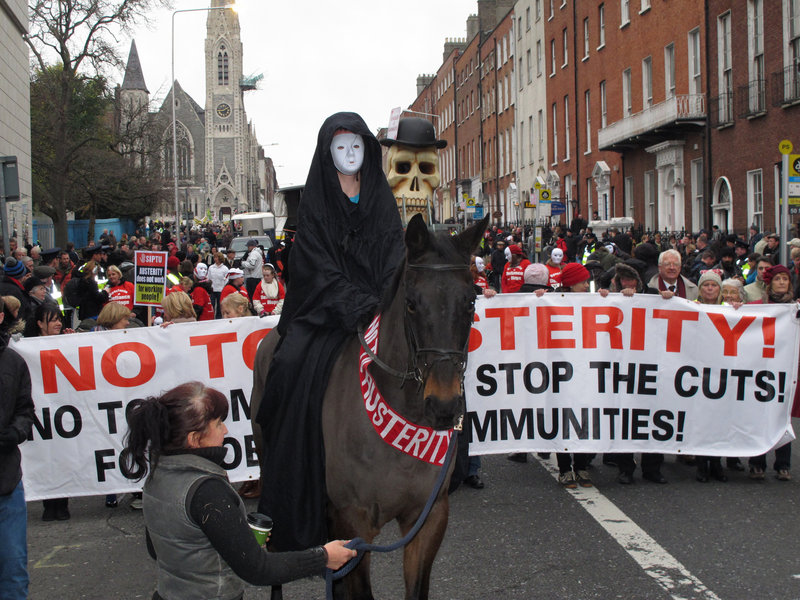DUBLIN – About 10,000 socialist protesters marched Saturday through Dublin in opposition to government plans to unveil Ireland’s sixth-straight austerity budget.
The capital’s major boulevard, O’Connell Street, was filled in both directions with marchers, some donning ghostly white masks and Santa hats.
The demonstrators were from a wide range of anti-tax campaigns, labor unions and community groups, most of them with a hard-left bent. Many bore banners denouncing government leaders and vowing not to pay new and future tax hikes.
“The government can’t be given a free hand to cut whatever they like. You have to be willing to get out on the streets and do something,” said Lizzy Stringer, a 26-year-old school assistant who marched in a handmade protest suit emblazoned with words summarizing the despair behind Ireland’s debt crisis: hunger, depression, suicide.
The parade mixed darker themes with gallows humor. A rider on horseback in white mask and black cape depicting Death led the parade, while the horse had a “no to austerity” banner round its neck.
On placards Irish leaders were portrayed as serpents, with pleas to St. Patrick to return and banish them from Ireland. Marchers donned Santa hats, some bearing the slogan “No no no!” rather than ho ho ho, and warned that the government wanted to play Grinch.
Ireland faces more protests in the buildup to the Dec. 5 budget, when the government of Prime Minister Enda Kenny is committed to unveiling a further $4.5 billion in spending cuts and tax hikes in this country of 4.6 million.
Ireland already has pledged to keep imposing annual cuts and tax hikes through at least 2015 as part of its austerity program, begun in 2009, to combat yawning deficits and fund a colossally expensive bank rescue program. Ireland’s long-booming economy plunged in 2008 as credit-fueled property speculation collapsed, forcing Ireland to nationalize five of its six banks.
Ireland faced the risk of national bankruptcy in 2010 when it was forced to negotiate an international bailout. The last of the more than 87 billion borrowed from European Union partners and the International Monetary Fund is scheduled to be spent next year, by which time Ireland is supposed to be borrowing normally again on bond markets. It has begun to dip its toe back into those markets since the summer.
While many on Saturday’s march called for sterner action such as national strikes, labor leaders here have sought instead to negotiate with the government in hopes of minimizing job losses and pay cuts.
That tension between a radical grassroots and cautious leadership was obvious as union leaders tried to speak from a makeshift stage in front of Dublin’s colonnaded General Post Office, but were interrupted by hecklers chanting “Strike!”
“We need to play our part in the growing movement of resistance across Europe,” said Richard Boyd Barrett, a member of Irish parliament and of People Before Profit. “And we have to bring this government down if they continue with this disastrous policy of austerity.”
Send questions/comments to the editors.



Success. Please wait for the page to reload. If the page does not reload within 5 seconds, please refresh the page.
Enter your email and password to access comments.
Hi, to comment on stories you must . This profile is in addition to your subscription and website login.
Already have a commenting profile? .
Invalid username/password.
Please check your email to confirm and complete your registration.
Only subscribers are eligible to post comments. Please subscribe or login first for digital access. Here’s why.
Use the form below to reset your password. When you've submitted your account email, we will send an email with a reset code.